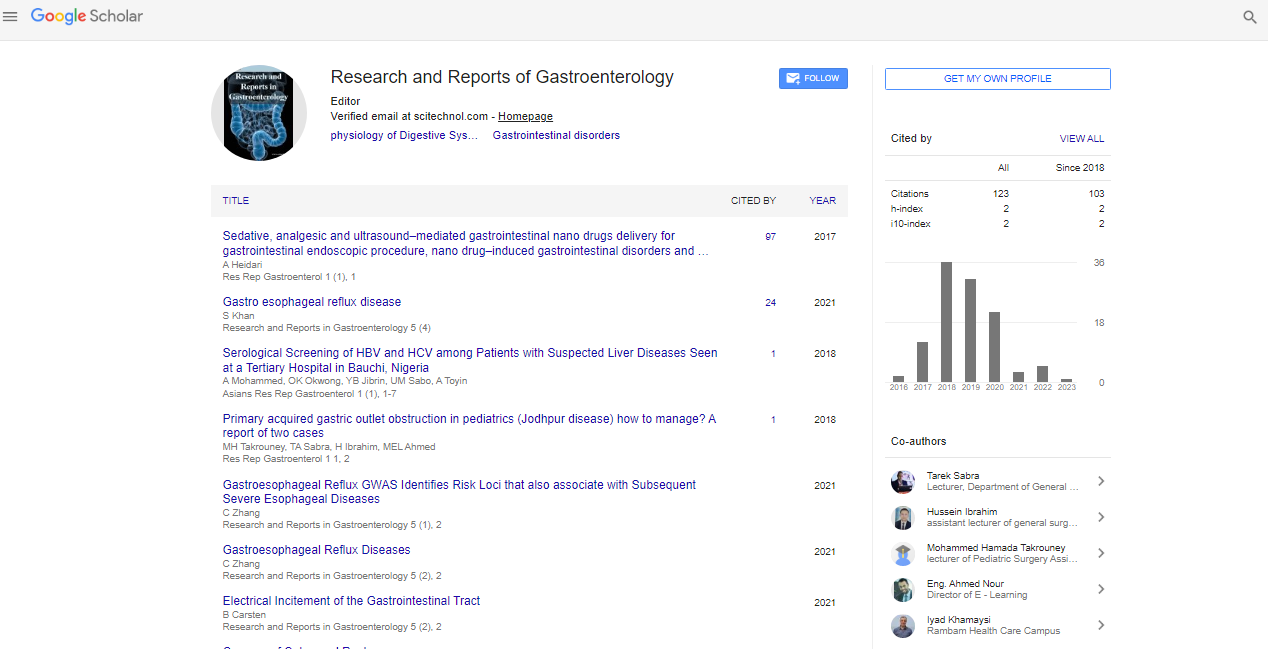Opinion Article, Res Rep Gastroenterol Vol: 7 Issue: 1
Role of Colonoscopy in Preventing Colorectal Cancer
Simon John*
Department of Gynecology, University of Toronto, Ontario, Canada
*Corresponding Author: Simon John
Department of Gynecology, University of Toronto, Ontario, Canada
E-mail: john_s@gmail.com
Received date: 20 February, 2023, Manuscript No. RRG-23-97824;
Editor assigned date: 22 February, 2023, PreQC No. RRG-23-97824 (PQ);
Reviewed date: 08 March, 2023, QC No. RRG-23-97824;
Revised date: 15 March, 2023, Manuscript No. RRG-23-97824 (R);
Published date: 23 March, 2023, DOI: 10.4172/Rrg.1000135
Citation: John S (2023) Role of Colonoscopy in Preventing Colorectal Cancer. Res Rep Gastroenterol 7:1.
Description
Colorectal cancer is one of the most common types of cancer worldwide, and it is estimated that over 1.8 million new cases of colorectal cancer will be diagnosed in 2022. Despite the high prevalence of colorectal cancer, it is a preventable disease, with early detection and screening playing a crucial role in reducing the incidence and mortality of this cancer. Colonoscopy is one of the most effective methods of screening for colorectal cancer, and it plays a significant role in preventing the development of this disease.
Colonoscopy is a medical procedure used to examine the inside of the colon and rectum. During a colonoscopy, a flexible tube with a camera is inserted into the rectum, allowing the doctor to examine the entire colon. The camera allows the doctor to identify any abnormal growths or polyps in the colon that may be precursors to colorectal cancer. If any polyps or abnormal growths are detected, they can be removed during the procedure, preventing them from developing into cancerous tumors.
Colonoscopy plays a significant role in preventing colorectal cancer, and it is considered the gold standard for detecting and preventing this disease. The primary goal of colonoscopy is to detect precancerous polyps in the colon and remove them before they develop into cancerous tumors. Studies have shown that the removal of precancerous polyps during colonoscopy can reduce the incidence of colorectal cancer by up to 80 percent.
Colonoscopy is also an effective tool for detecting early-stage colorectal cancer. If colorectal cancer is detected early, it can be treated successfully, with a high rate of survival. Studies have shown that individuals who undergo regular colonoscopies have a significantly lower risk of developing advanced-stage colorectal cancer compared to those who do not undergo regular screening.
The American Cancer Society recommends that individuals at average risk of developing colorectal cancer begin regular screening at the age of 45. Individuals with a family history of colorectal cancer or other risk factors may need to begin screening earlier. The frequency of colonoscopies depends on the individual's risk factors, and their doctor will recommend the appropriate screening schedule.
Preparing for a colonoscopy involves a clear liquid diet for at least 24 hours before the procedure. The individual will also need to take a laxative to clear the colon of any waste. The procedure itself usually takes about 30-60 minutes, and the individual will be sedated to make them more comfortable.
Like any medical procedure, colonoscopy carries some risks and side effects. The most common side effect of colonoscopy is temporary discomfort and bloating. In rare cases, the procedure can cause bleeding or perforation of the colon. However, the risk of serious complications is very low, and the benefits of colonoscopy far outweigh the risks.
Colonoscopy is a highly effective method of screening for colorectal cancer, and it plays a crucial role in preventing this disease. By detecting precancerous polyps in the colon and removing them, colonoscopy can reduce the incidence of colorectal cancer by up to 80 percent. Regular colonoscopies are recommended for individuals at average risk of developing colorectal cancer, and the frequency of screening depends on the individual's risk factors. Although colonoscopy carries some risks and side effects, the benefits of this procedure far outweigh the risks, and it is a critical tool in the fight against colorectal cancer.
 Spanish
Spanish  Chinese
Chinese  Russian
Russian  German
German  French
French  Japanese
Japanese  Portuguese
Portuguese  Hindi
Hindi 